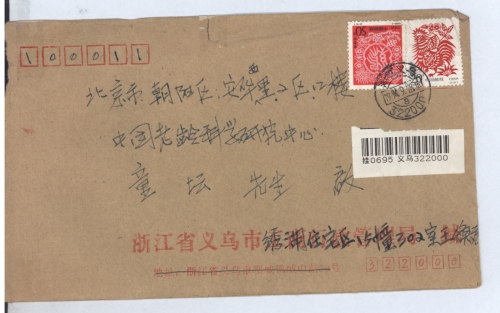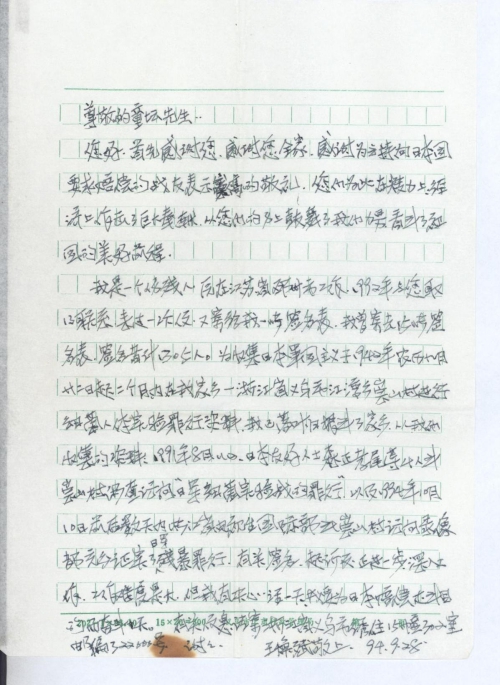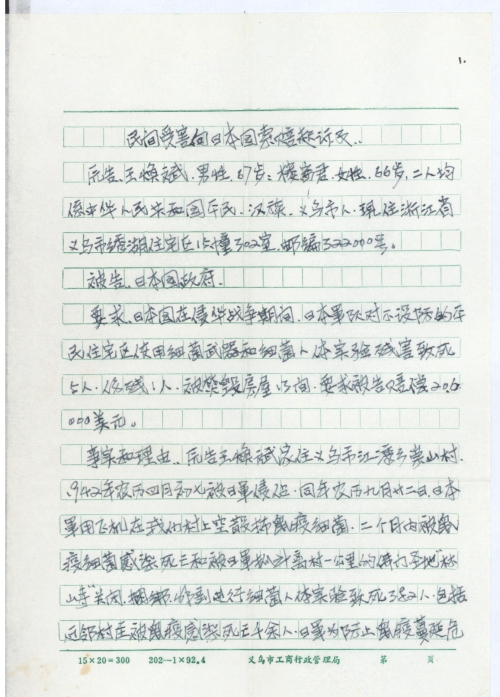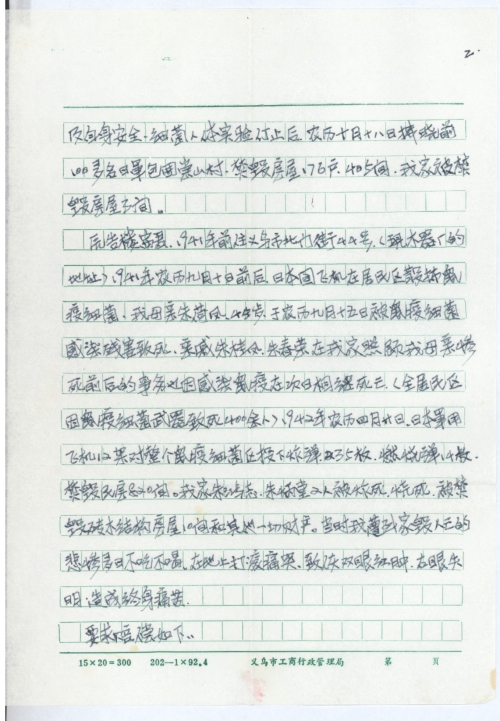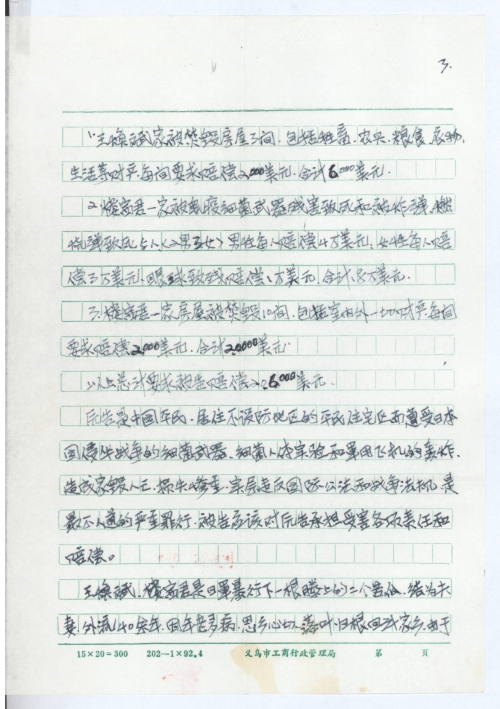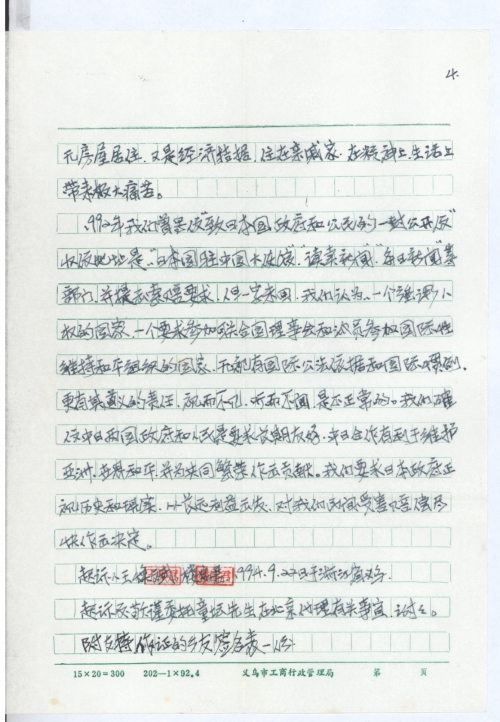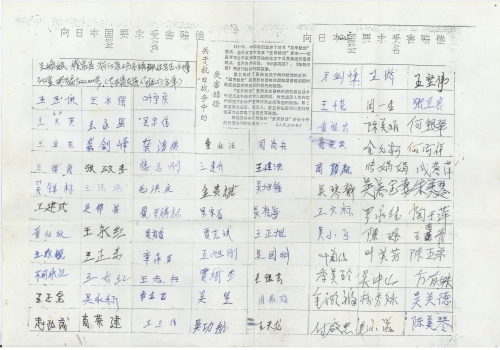Date of letter:1994-09-28
Address of author:Yiwu City, Zhejiang Province
Date of event:1942-09-20(lunar calendar)
Location of event:Yiwu City, Zhejiang Province
Name of author:Wang Huanbin
Name(s) of victim(s):Zhu Hefeng (Wang Huanbin’s mother) and multiple relatives and civilians
Type of atrocity:Biological/Chemical Warfare, Others, Air Bombings(BC, OT, AB)
Other details:On September 20, 1942 on the lunar calendar, the Japanese Army used aircrafts to spread plague bacteria in the sky above our village, and more than one hundred villagers were infected by bacteria. In order to prevent spreading, 405 houses were burned, including my family’s 3 houses. The Japanese Army then bombed villages with plague, my family members and relatives were killed, houses and properties were all destroyed. Japanese invasion brought huge damage to my family, I demand the Japanese government to offer compensation according to my claim. A signature form is attached.
Respectable Mr. Tong Zeng,
Hello! First of all, we would like to thank you and your whole family. We would also like to thank and salute all comrades working on the reparation claims against Japan. You have made great efforts and financial contributions to the cause. You have inspired us, given us strength, and let us see a bright future for our country.
I am a disabled man and have once worked in Pizhou City, Jiangsu Province. In 1992, after I got in touch with you, you sent me a letter and a signature form. Later, I sent you 15 signature forms signed by a total of 1,305 people. I have moved back to my hometown in order to gather information about the Japanese army’s crime of carrying out human bacterial experiments in Chongshan Village, Jiangwan Town, Yiwu City, Zhejiang Province, for 2 months starting lunar September 22, 1942. As far as we know, on August 11, 1991, 4 friendly Japanese people, including Masataka Mori [Editor’s note: Masataka Mori is a well-known Japanese scholar/researcher on Japanese war crimes.] came to Chongshan Village to investigate the Japanese army’s crime of carrying out bacterial experiments. Then approximately around October 10, 1994, Zhejiang Provincial TV Station aired a segment on investigation and interviews in Chongshan Village by its International Department. The information fully attests to the atrocities committed by the Japanese army. Currently, relevant works such as collecting signatures and the preparation of letters of claim are in progress. The job is indeed difficult, but I am determined to devote to the goal of making Japan compensate us as long as I am alive. If you have any information, please send it to Room 302, Building 15, Xiuhu Community, Yiwu City, Zhejiang Province. Postal code: 322606. Thank you!
Sincerely,
Wang Huanbin
September 28, 1994
Victims’ Letter of Civil Claim for Compensation against Japan
Claimants: Wang Huanbin, male, 67, and Lou Saijun, female, 66. Both are citizens of the People’s Republic of China, Han ethnic origin, born in Yiwu and now live in Room 302, Building 15, Xiuhu Community, Yiwu City, Zhejiang Province (postal code: 322000).
Defendant: Japanese government
Claim: During Japan’s war of aggression against China, the Japanese army killed 5 people and injured 1 person in our families by using bacterial weapons and carrying out human bacterial experiments in an undefended residential area. They also destroyed our 13 houses. The claimant demands a compensation of USD 206,000 from the defendant.
Facts and grounds: The claimant Wang Huanbin originally lived in Chongshan Village, Jiangwan Town, Yiwu City. On lunar April 7, 1942, his hometown was occupied by the Japanese army. On lunar September 22 of the same year, Japanese planes spread plague bacteria over the village. Within two months after that, 382 people died either due to plague infection or being imprisoned, bounded, and dissected for the purpose of human bacterial experimentation by the Japanese army in a Buddhist shrine called Linshan Temple, about 1 km away from Chongshan village. Besides, over 1,000 people from neighboring villages died after being infected with the plague. Fearing that the spread of the plague might endanger themselves, the Japanese army stopped human experiments and, before dawn of lunar October 18, over 100 Japanese soldiers surrounded Chongshan Village and burned 405 houses of 176 households, including my family’s 3 houses.
The claimant Lou Saijun lived in No. 44, Beimen Street, Yiwu City (now the address of a wood plant) before 1941. Around lunar September 10, 1941, Japanese planes spread plague bacteria over the residential area in Yiwu. Then, my 45-year-old mother Zhu Hefeng caught the plague and died on lunar September 15. My relatives Zhu Guifeng and Zhu Chunrong caught the plague from taking care of my mother and died the next day (Over 400 people from the residential area died of the plague). On lunar April 20, 1942, 12 Japanese military planes dropped 35 bombs and 14 incendiaries in the entire plague-stricken area, burning down 820 residential houses. 2 of my family members Zhu Hongzhi and Zhu Bingtang were bombed and burned to death and 10 of my family’s brick and wood houses were destroyed, along with all properties in them. As my family was torn apart, I couldn’t eat or drink for days. I cried my heart out until my eyes were swollen and my right eye went blind – a permanent suffering I had to bear the rest of my life.
Therefore, we demand compensation as shown below:
1. As Wang Huanbin family’s 3 houses were burned down along with properties such as livestock, farming tools, grain and clothes within them, the claimants demand a compensation of USD 2,000 for each of the houses. That is, a total of USD 6,000.
2. As 5 members (2 men and 3 women) of Lou Saijun’s family died of plague or were bombed to death, the claimants demand a compensation of USD 40,000 for each men and USD 30,000 for each women and a compensation of USD 10,000 for the blinding of Lou Saijun’s right eye. That is, a total of USD 180,000.
3. As Lou Saijun family’s 10 houses were burned down along with all property within or outside the houses, the claimants demand a compensation of USD 2,000 for each of the houses. That is, a total of USD 20,000.
Thus, the claimants demand a total compensation of USD 206,000 from the defendant.
The claimants are Chinese civilians. During Japan’s war of aggression against China, they lived in an undefended residential area, where the Japanese army spread bacteria of plague and carried out human bacterial experiments. Afterwards, Japanese planes bombed the area, causing serious life and property losses to the claimants. The Japanese army committed serious inhuman crimes by violating international laws of war. The defendant must take the responsibility for all the losses and sufferings and compensate the claimants.
We (Wang Huanbin and Lou Saijun), like two bitter melons on a vine, are both victims of the atrocities committed by the Japanese army. After getting married, we lived a vagrant life for over 40 years. We have come back to our hometown due to sickness and old age, but we have to live with a relative as we have no house of our own and we are short of money, causing great pain to us both materially and mentally.
In 1992, we wrote a letter entitled An Open Letter to the Japanese Government and People, which was sent to agencies such as the Japanese embassy in China, Yomiuri Shimbun and the Daily News. The letter demanded compensation. But we did not receive a single reply. We do not think it is normal for a country that emphasizes human rights, requests to be a member of the United Nations Security Council, and sends people to the international peacekeeping organizations to ignore its responsibilities in justice as well as following international laws and practices. We firmly believe that the Chinese and Japanese governments and peoples want a long-term friendship, know that Sino-Japanese cooperation is beneficial to the peace in Asia and across the world, and wish to contribute to mutual prosperity. We demand the Japanese government to face up to history and reality and, from the perspective of long-term interests, make a prompt decision about compensating victims like us.
Claimants Wang Huanbin (Personal seal) and Lou Saijun (Personal seal). September 22, 1994, yiwu, Zhejiang.
We entrust the letter of claim with Mr. Tong Zeng in Beijing. Please handle the matter for us. Thank you.
Attached is a list of signatures of our friends and fellow townspeople who are willing to be our witnesses.
About Damage Compensation in the Anti-Japanese War
In 1977, the Chinese government gave up war reparations from Japan but did not declare giving up damage compensation. This is an important view repeatedly elaborated by the young jurist Tong Zeng in his paper which has attracted much public attention. It has been outlined in magazines such as China Business Herald and Legal Daily.
In his paper, Tong explained the difference between war reparations and damage compensation in accordance with international law: War reparations are paid by the defeated countries that launched the war to the invaded countries for their losses while damage compensation is paid by the defeated countries that launched the war for committing serious crimes against the people and property of the invaded countries that violate the laws of war and humanitarian principles during the war.
After the World War II, Jewish, Polish and French people successfully claimed for a large amount of damage compensation on the grounds of Nazi persecution.
And the damage compensation our country should demand from Japan is USD 180 billion.
CPPCC News
Demanding damage compensation from Japan
Supporting signatures
Wang Huanbin, Lou Saijun. Room 302, Building 15, Xiuhu Community, Yiwu City, Zhejiang Province. Postal code: 322000. (Below is a list of people who are willing to be our witnesses).
Wang Zhenggeng, Wang Yongqiang, Ye Yuqing, Wang Tianfu, Wang Chengjian, Wu Zongwei, Wang Jinhua, Gong Jianfeng, Gong Qingwei, Tong Huayun, Zhou Shangbing, Wang Jinxia, Zhang Zhengwei, Lou Zhigang, Wang Jiansheng, Wang Jianhong, Wu Jinbiao, Wang Fahong, Mao Hongqing, Jin Guibin, Wu Xufeng, Wang Jianwu, Wu Jincheng, Jia Tengbiao, Wu Zongyi, Wu Youhai, Tong Shijiao, Wang Yonghong, Jia Fenxiang, Jia Zhibin, Wang Zhengxu, Wang Yongrui, Wang Zhengdong, Zhang Pingying, Wang Xugang, Wu Guoming, Ke Yongjiang, Wang Qiaoji, Wang Zhibing, Jia Binjie, Wang Yinfang, Wang Zhengbao, Wu Yongxin, Zhang Jinfu, Wu Jian, Zhou Yanjuan, Zhao Zhengcheng, Shang Yingjian, Wang Weiwei, Wu Gonghang, Wang Tianlong, Fang Jianfeng, Wang Jiao, Wang Jianwei, Wang Qianhua, Zhou Yisheng, Zhang Weiliang, Tong Guiyun, Chen Meijuan, He Yincui, Shang Xiaoying, Jin Yuansong, He Axiang, Shang Qinchao, Zhang Juanjuan, Cheng Rongping, Wu Qinjing, Wu Haobao, Zhu Meiqin (Wu Haobao’s wife), Wang Wenbiao, Luo Yongde, Tao Yuping, Wu Xiaofei, Chen Chen, Wang Miaoqing, Ye Juxian, Ye Meifang, Chen Wudi, Ji Meiling, Wu Zhongshan, Fang Youmei, Jin Chaofu, Lou Xiumei, Wu Guande, Fu Qizhong, Mao Xiaozi, Chen Meiqin














